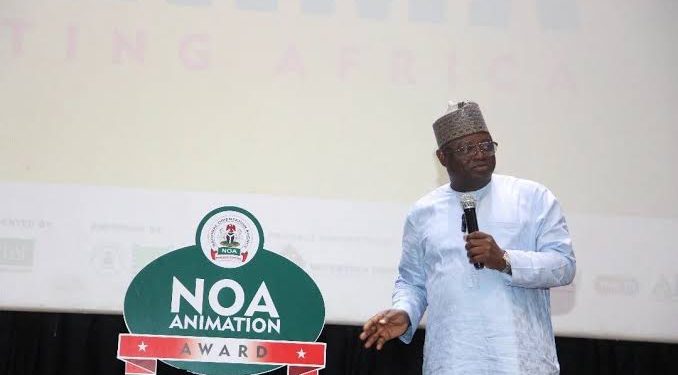As the 2025 Lagos International Festival of Animation came to a close, the National Orientation Agency announced a major initiative aimed at transforming Nigeria’s animation sector and strengthening cultural ownership in digital storytelling. The agency confirmed the introduction of a new competition category titled the Real Nigerian Animation Challenge, which will debut at the 10th edition of the festival in 2026.
The initiative is aligned with the Federal Government’s emerging policy to nationalise cartoon content and utilise animation as a strategic tool for cultural expression, value reorientation, and the reinforcement of national identity. Speaking at the festival’s closing ceremony at the Mike Adenuga Centre in Ikoyi, the Director-General of the National Orientation Agency, Lanre Issa-Onilu, said the competition is designed to reward excellence while promoting themes rooted in the National Values Charter.
The challenge will be open exclusively to Nigerian animators and will accommodate 2D, 3D, and stop-motion formats. Each entry must not exceed three minutes and must depict at least one core Nigerian value such as resilience, optimism, unity, or integrity. Significant incentives have been attached to the launch, including multi-million-naira prizes for the top three entries. Beyond monetary rewards, all shortlisted works will receive three months of free national television airtime to enhance exposure and audience reach.
Issa-Onilu explained that the agency is pursuing a broader cartoon nationalisation policy to reduce the dominance of foreign animated content, which often misaligns with Nigeria’s cultural narratives and moral framework. He noted that the animation industry holds enormous potential for youth employment, intellectual property development, and soft power projection, especially as global demand for African storytelling continues to grow.
The announcement drew strong support from industry stakeholders. LIFANIMA Festival Director, Muyiwa Kayode, welcomed the government’s renewed intervention, stating that authentic Nigerian stories have long awaited a dedicated platform within the animation ecosystem. He emphasised that with proper institutional backing, Nigerian animators can compete globally while preserving indigenous folklore, languages, and heritage.
For Nigeria’s creative economy, the Real Nigerian Animation Challenge represents more than a competition—it signals a policy shift toward indigenous content protection, industry funding, and the commercial empowerment of local creators. As attention turns to the 2026 edition of LIFANIMA, animators, studios, and digital storytellers are expected to prepare for what could become one of the country’s most influential platforms for cultural innovation.










